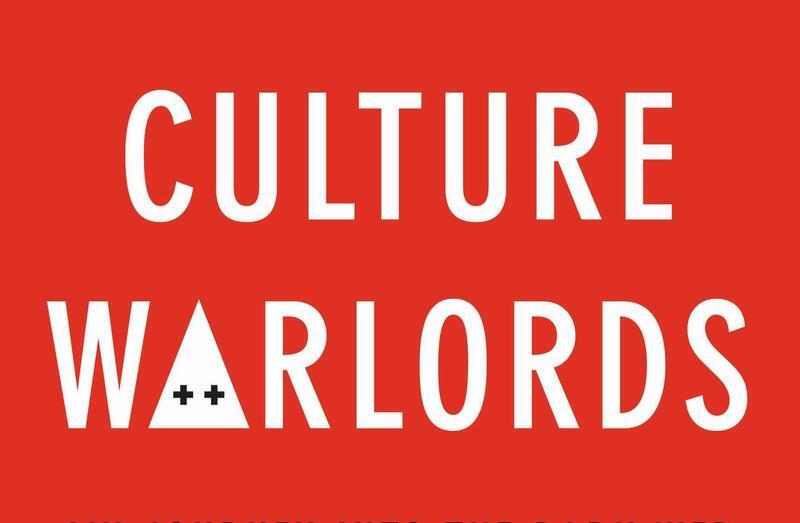In "Culture Warlords" Talia Lavin Unmasks Nazis and Sheds Light on the Dark Web
Justine Orlovsky-Schnitzler is JWA's politics writer.
Talia Lavin’s Culture Warlords: My Journey Into the Dark Web of White Supremacy opens with a slogan that originated in the early twentieth century but was most famously invoked by Dolores Ibárruri during the Battle of Madrid in 1936: ¡No pasarán! (They shall not pass).
The “they” referenced in this quote are fascists. If you are like me, you might have grown up learning that fascism is nearly impossible to define; that true fascists, like Mussolini, are enemies of a bygone era. This, of course, is nonsense. Fascism is not unusually difficult to identify or define (though the definition is certainly routinely muddled in modern discourse). Many historians argue that fascism can best be understood as a series of escalations; it begins with hostile, far-right fantasies that ferment in individuals and in groups, and ends in eventual state control, with a gradient of increasingly violent and dehumanizing policies in between.
Though white nationalism and fascism and Nazism do not overlap perfectly, they bleed into each other. More importantly, as a multi-headed serpent of ideologies, they are not unique within our modern era. The same can be said of antisemitism; today’s white nationalists repackage and rehash the same tired tropes and lies about Jewish political power, sexuality, and supposed blood libel that have plagued us for a millennia. The differences between today’s fascist sympathizers and those of the past lie in their mediums of communication and organization. In Culture Warlords, Lavin traces the threats posed by far-right extremism as it proliferates online—from incels (“involuntary celibates”) to Proud Boys to Boogaloos, all united in their unwavering commitment to making the world dangerous for anyone who deviates from their hateful ideals.
Lavin is not writing to persuade those concerned with the semantics of identifying the dangers of white nationalism. This is not a text for those still fretting over the pros and cons of using the term “Nazi” to refer those who shouted “Jews Will Not Replace Us” in Charlottesville three years ago. Culture Warlords drops you directly into the deep end because that’s what it feels like to be engulfed by white nationalism. It’s like missing a step on the stairs—nauseating, disarming, and disorienting.
Lavin, of course, is no stranger to the ire of the dark web. She is, in own words, “every skinhead’s worst nightmare: a loud and unapologetic Jewish woman, acerbic, smart, and profoundly antiracist.” A former fact checker for the New Yorker (and once the voice behind JWA’s Ask Emma advice column), Lavin found herself the target of frequent white nationalist attacks online—both by virtue of her willingness to publicly and proudly identify as a Jewish antifascist, and also due to a coordinated offensive initiated by Immigration and Customs Enforcement following a tweet by Lavin speculating on the the potential far-right affiliation of an ICE agent. “That’s my Joker origin story of how I came to report on the far right,” Lavin told Ken Klipperstein for The Nation. “I was flung face-first into a vat of poison.”
After resigning from the New Yorker and making a career as a freelance writer, Lavin kept herself submerged in that vat. Culture Warlords began as a project to uncover the identities and goals of an overlapping web of right-wing hate groups. Lavin spent more than a year logging onto white nationalist messaging boards and dating sites. She gained access to organizing spaces and group chats under pseudonymous personas. Sometimes she was Ashlynn, a blonde Iowan looking for an Aryan prince on WhiteDate.net (a persona she utilized to successfully identify a prominent Ukrainian white nationalist). In another chapter, she writes about her experiences as Tommy, an incel looking to find a community built on violent misogyny.
Lavin wants to unmask her subjects, not understand them. This is an important distinction. She doesn’t paint them as “monsters beyond comprehension”—that would excuse the ways in which extremism grows and flourishes thanks to winks, nods, and the so-called marketplace of ideas. “They’re people,” she writes. “Just people, mostly men and some women, all over this country and this world, who have chosen to hate, to base the meaning of their lives on hate, to base their communities of solidarity on hate, to cultivate their hate with daily, tender affection.”
Culture Warlords asks the reader to understand that fascism cannot be defeated with witty debate, intellectual slam-dunks, or persuasive appeals to some kind of common human decency. If you give these people and their communities an inch, they will take a mile. If you allow them to spread their messages, they will reach willing compatriots. “The effects of these ideas when they are aired out is much like Zyklon B,” Lavin states plainly. “Studying them as deeply as I have has made me realize no amount of such rhetoric is acceptable in the country’s discourse, just as there is no acceptable amount of poisonous gas to let seep into a room.”
What has lingered with me since finishing Culture Warlords is the sense of profound unhappiness that comes from understanding how vehemently people you have never met can hate you and the people you hold most dear. “As I researched this book,” Lavin writes, “…the anger I felt calcified into a parallel hatred—one based not on skin color but on the sheer accumulation of vitriol I consumed and the way people I’d never met spoke about killing people who look just like my nieces and nephews, my cousins and aunts, my lovers, my friends, me.”
Culture Warlords is not a book interested in consolation. Though Lavin is a deft, funny writer who takes pleasure in twisting the metaphorical knife into the backs of the white supremacists she identifies and unmasks, she writes soberly of the only viable way to extinguish the smoldering embers of the alt-right: anti-fascist organizing. This means pushing back against any normalization of extremist rhetoric, refusing to entertain the supposed anxieties of skinheads, and showing up in numbers when they take to the streets. “To do so is to deprive them of the power to organize in total darkness,” Lavin writes. “It is to drag them by their hair into the light and let them scream.”
I made the mistake of reading Culture Warlords primarily at night; my partner would switch out the light and slip into sleep, leaving me to watch shadows on the ceiling and contemplate what it is about us that makes white nationalists froth at the mouth. The people and movements Lavin profiles in her book haunt me at the margins, and will undoubtedly continue to do so. But as scary a read as Culture Warlords is, it is also an urgent, necessary, and instructive one. Lavin’s debut is both a call to action and a testament to how much our safety depends on our solidarity. To live joyful, meaningful, and peaceful lives, forceful opposition to those that would destroy us is the only way forward. We must know them, name them, deplatform them—and, as Lavin suggests, let them scream into the void.








Haven't yet read the book,. . likely will. But it is too bad that the word "warlord" was used in the title. It is a powerful image which can be associated with dignity and valor. Its application is an amplification, even a celebration of these people. This works against "deplatforming" them. I wish the word, "warmonger" had been used instead. Words matter.